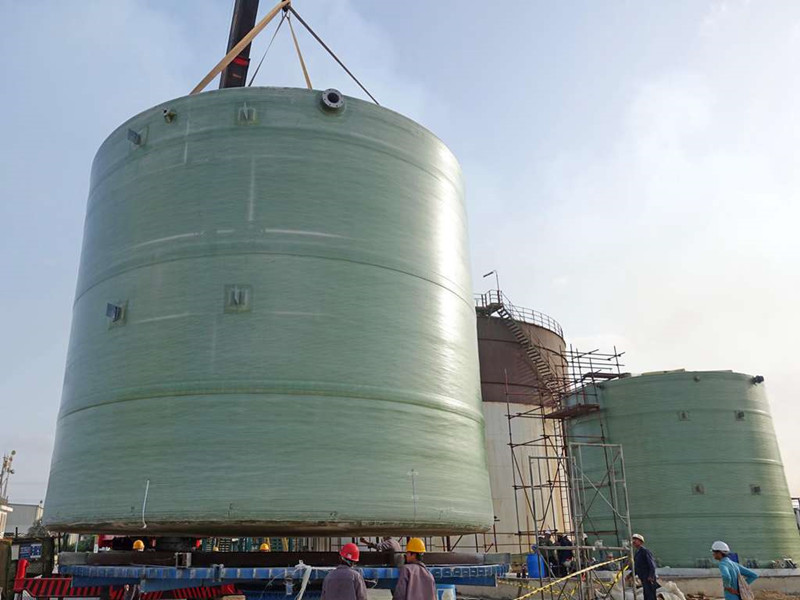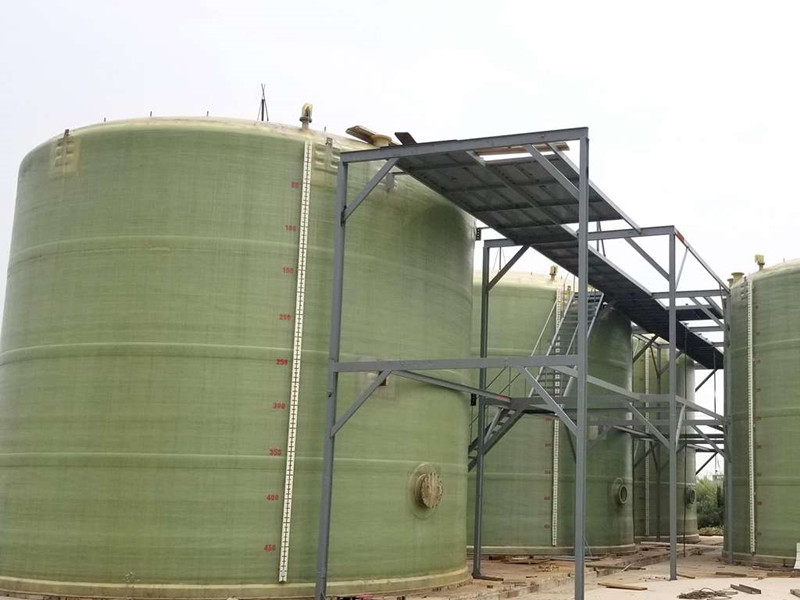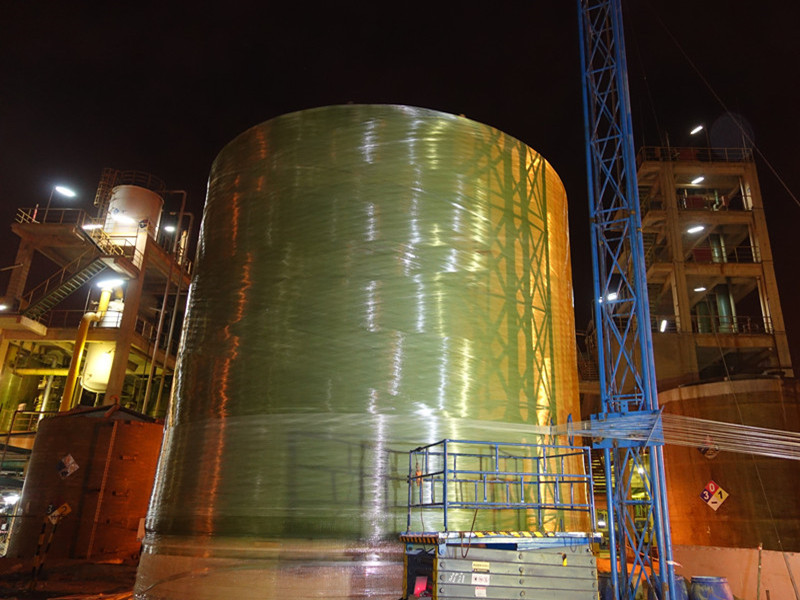Large Size Field Tanks-Jrain|Custom FRP Storage&On-site Manufacturing
Large Size Field Tanks are engineered for industrial applications where transporting pre-fabricated storage solutions is impractical. These tanks are manufactured on-site using specialized fiberglass-reinforced polymer (FRP) technology, offering unparalleled flexibility for storing corrosive, abrasive, or hazardous materials. This article explores the features, advantages, technical specifications, and real-world applications of these tanks, along with insights into the company behind the innovation: Jrain.
Understanding the Manufacturing Process
The production of Large Size Field Tanks follows a meticulous five-step process designed to ensure structural integrity and compliance with industry standards. First, a dedicated manufacturing team is mobilized, and a project manager is appointed to oversee the operation. The necessary machinery and materials are then transported to the project site. Next, the winding machine and molds are assembled on-site, tailored to the desired tank diameter. This customization ensures precision in the final product.
Once the equipment is set up, the liner is created, followed by the fiberglass winding process, which is executed according to the design specifications. After the tank is demolded, it is positioned at the designated location. Finally, fittings such as nozzles, ladders, and handrails are installed, and a hydrostatic test is conducted to verify the tank's durability before handover to the client.
Jrain’s expertise lies in providing customized winding machines and molds that enable this on-site manufacturing. The mechanical properties of the laminates produced through their field winding equipment are comparable to those manufactured in controlled workshop environments. However, project schedules must account for the time required to set up the mobile winding systems.
Key Features of Large Size Field Tanks
These tanks are designed to meet the unique demands of industrial storage. One of their standout features is their customizability, allowing the selection of different resins and fiberglass types to suit the specific service conditions. For instance, tanks storing corrosive liquids may use specialized resins, while those handling abrasive materials incorporate reinforced fiberglass layers.
Another critical feature is their cost-effectiveness. On-site manufacturing minimizes transportation costs and logistical challenges, particularly for oversized tanks. This approach also allows for seamless coordination with other on-site contractors, streamlining the overall project timeline. Additionally, the ability to produce tanks in sizes ranging from DN4500mm to DN25000mm makes them ideal for large-scale industrial applications.
Technical Specifications
| Parameter | Details |
|---|---|
| Material | Fiberglass-Reinforced Polymer (FRP) |
| Size Range | DN4500mm – DN25000mm |
| Standards Compliance | ASME RTP-1, ASTM D3299, ASTM D4097, BS EN 13121 |
| Customization Options | Resin types, fiberglass layers, and additives for corrosion/abrasion resistance |
| Installation | On-site assembly with hydrostatic testing |
Applications in Industrial Settings
Large Size Field Tanks are widely used in industries that require durable, corrosion-resistant storage solutions. Key application scenarios include:
- Chemical Processing: Storing acids, solvents, and other reactive substances.
- Water and Wastewater Treatment: Handling aggressive chemicals and high-volume water flows.
- Oil and Gas: Storing crude oil, refined fuels, and hazardous byproducts.
- Power Generation: Managing cooling water and chemical storage for power plants.
The tanks’ ability to withstand harsh environments makes them a preferred choice for facilities operating in challenging conditions. For example, in chemical plants, the use of specialized resins ensures that the tanks remain intact even when exposed to extreme pH levels or high temperatures.
Company Background: Jrain
Based in Hengshui, Hebei, China, Jrain (衡水嘉润玻璃钢有限公司) is a leading manufacturer of fiberglass tanks and vessels. With extensive experience in both domestic and international projects, the company has successfully delivered large-scale FRP solutions across diverse environments. Their expertise in field manufacturing has made them a trusted partner for industries requiring customized storage systems.
Jrain’s commitment to quality is reflected in their adherence to global standards such as ASME RTP-1 and ASTM D3299. The company also provides comprehensive training to clients on the operation of their winding machines, ensuring that end-users can maintain and utilize the equipment effectively.
Advantages of On-Site Manufacturing
One of the primary benefits of Large Size Field Tanks is their ability to overcome logistical challenges. Traditional manufacturing and transportation methods often face limitations when dealing with oversized tanks, leading to increased costs and delays. On-site production eliminates these issues, offering a more efficient and cost-effective alternative.
Additionally, on-site manufacturing reduces the risk of damage during transit, which is a common concern for large, fragile structures. By producing the tanks at the final location, Jrain ensures that the products are delivered in optimal condition, ready for immediate installation.
Ensuring Quality and Compliance
Jrain’s quality assurance processes are aligned with internationally recognized standards. The company’s tanks undergo rigorous testing to meet requirements set by ASME and ASTM, ensuring reliability and safety. For instance, the ASME RTP-1 standard outlines the design, fabrication, and testing criteria for thermoplastic tanks, while ASTM D3299 provides guidelines for the production of FRP tanks.
According to the National Institute of Standards and Technology (NIST), compliance with such standards is critical for ensuring the performance and longevity of industrial equipment. NIST’s research on composite materials highlights the importance of standardized testing procedures to validate the mechanical properties of FRP structures (NIST Reference).
Image Gallery



Conclusion
Large Size Field Tanks represent a transformative solution for industries requiring robust, customizable storage systems. With their ability to address logistical challenges, withstand harsh environments, and comply with global standards, these tanks are a testament to the advancements in fiberglass-reinforced polymer technology. Companies like Jrain continue to drive innovation in this field, delivering high-quality solutions that meet the evolving needs of industrial applications.
References
National Institute of Standards and Technology (NIST). (n.d.). Standards and Measurements. Retrieved from https://www.nist.gov.
NIST Research on Composite Materials. (2023). Validation of Mechanical Properties for Industrial Applications. Retrieved from https://www.nist.gov.
Latest news
-
Drill Rod Connections Understanding the Basics and Its Global SignificanceNewsNov.24,2025
-
Rectangular Tank Made of Fiberglass Material – Durable, Cost-Effective Liquid Storage SolutionsNewsNov.24,2025
-
Hollow Drill Rods for Efficient Drilling Operations in the Field | Durable, Lightweight & CustomNewsNov.23,2025
-
Powerful yt27 Rock Drill for Tough Mining Surfaces | Durable & PortableNewsNov.23,2025
-
Why the Reversible Drill Bit Is a Versatile Tool for All Your Drilling NeedsNewsNov.22,2025
-
Fiberglass Food Grade Equipment: Key Features, Benefits & Global ImpactNewsNov.22,2025











